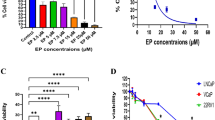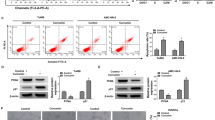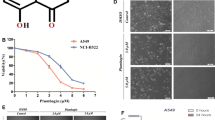Abstract
Jolkinolide B (JB) is a bioactive diterpenoid, isolated from the root of Euphorbia fischeriana Steud, and has been reported to have anti-tumor and anti-inflammation function by regulation of cell migration, invasion, apoptosis, and cell cycle. We aimed to evaluate the effect of JB on laryngeal cancer cells. Human normal larynx epithelial (HBE) cells and cancer cell lines TU212, TU177, and Hep-2 were cultured; MTT assay was used to assess cell proliferation. LY294002 (a PI3K/Akt inhibitor) and IGF-1 (a PI3K/Akt activator) were employed to investigate the expression of PI3K/Akt pathway. Cell migration and invasion activities were detected by scratch wound healing and transwell assay, respectively. Flow cytometry assay was used to assess cell apoptosis. The expression levels of proteins were assessed by immunofluorescence and Western blotting assay. JB inhibited TU212, TU177, and Hep-2 cell viability with an IC50 value of 54.57 ± 0.53 μg/mL, 44.82 ± 0.32 μg/mL, and 49.63 ± 0.47 μg/mL, respectively. Compared with control group, the proliferation, migration, and invasion of cells significantly decreased after JB and LY294002 treatment, while cell apoptosis increased. In IGF-1 group, the results were opposite compared to the JB and LY294002 groups. Western blotting results showed that JB and LY294002 treatment significantly inhibited the levels of Bcl-2, p-PI3K, and p-Akt while the levels of Bax, cleaved caspase-3, and PTEN protein significantly increased. Our study suggested that JB exhibits an inhibition effect on laryngeal cancer cell growth in vitro.





Similar content being viewed by others
References
Abu El-Asrar AM, Ahmad A, Alam K, Siddiquei MM, Mohammad G, Hertogh GD, Mousa A, Opdenakker G (2017) Extracellular matrix metalloproteinase inducer (EMMPRIN) is a potential biomarker of angiogenesis in proliferative diabetic retinopathy. Acta Ophthalmol 95(7):697–704
Aghdaei HA, Kadijani AA, Sorrentino D, Mirzaei A, Shahrokh S, Balaii H, Geraci M, Zail MR (2018) An increased Bax/Bcl-2 ratio in circulating inflammatory cells predicts primary response to infliximab in inflammatory bowel disease patients. United European Gastroenterol J 6(7):1074–1081
Bray F, Ferlay J, Soerjomataram I, Siegel R, Torre LA, Jemal A (2018) Global Cancer statistics 2018: GLOBOCAN estimates of incidence and mortality worldwide for 36 cancers in 185 countries. CA Cancer J Clin 68(6):394–424
Costa RLB, Han HS, Gradishar WJ (2018) Targeting the PI3K/AKT/mTOR pathway in triple-negative breast cancer: a review. Breast Cancer Res Treat 169(3):397–406
Gao X, Han H (2018) Jolkinolide B inhibits glycolysis by downregulating hexokinase 2 expression through inactivating the Akt/mTOR pathway in non-small cell lung cancer cells. J Cell Biochem 119(6):4967–4974
Gao C, Yan X, Wang B, Yu L, Han J, Li D, Zheng Q (2016) Jolkinolide B induces apoptosis and inhibits tumor growth in mouse melanoma B16F10 cells by altering glycolysis. Sci Rep 6:36114
Han MH, Lee WS, Nagappan A, Kim HJ, Park C, Kim GY, Hong SH, Kim ND, Ryu CH, Shin SC, Choi YH (2016) Polyphenols from Korean prostrate spurge Euphorbia supina induce apoptosis through the fas-associated extrinsic pathway and activation of ERK in human leukemic U937 cells. Oncol Rep 36(1):99–107
Li Y, Liu XL, Cai ZG, Zhang SX (2014) LC-ESI-MS/MS analysis and pharmacokinetics of jolkinolide B, a potential antitumor active component isolated from Euphorbia fischeriana, in rat plasma. Biomed Chromatogr 28(2):193–196
Lin Y, Cui H, Xu H, Yue L, Xu H, Jiang L, Liu J (2012) Jolkinolide B induces apoptosis in MDA-MB-231 cells through inhibition of the PI3K/Akt signaling pathway. Oncol Rep 27(6):1976–1980
Liu JC, Sun YX, Liu L, Yu C (2012) A water-soluble polysaccharide (EFP-AW1) from the alkaline extract of the roots of a traditional Chinese medicine, Euphorbia fischeriana: fraction and characterization. Carbohydr Polym 88(4):1299–1303
Livak KJ, Schmittgen TD (2001) Analysis of relative gene expression data using real-time quantitative PCR and the 2(-Delta Delta C(T)) Method. Methods 25:402–408
Paez J, Sellers WR (2003) PI3K/PTEN/AKT pathway. A critical mediator of oncogenic signaling. Cancer Treat Res 115:145–167
Pan H, Li T, Jiang Y, Pan C, Ding Y, Huang Z, Yu H, Kong D (2018) Overexpression of circular RNA ciRS-7 abrogates the tumor suppressive effect of miR-7 on gastric cancer via PTEN/PI3K/AKT signaling pathway. J Cell Biochem 119(1):440–446
Rogers C, Fernandes-Alnemri T, Mayes L, Alnemri D, Cingolani G, Alnemri E (2017) Cleavage of DFNA5 by caspase-3 during apoptosis mediates progression to secondary necrotic/pyroptotic cell death. Nat Commun 8:14128
Starska K, Forma E, Lewy-Trenda I, Stasikowska-Kanicka O, Skóra M, Bryś M (2018) Fibroblast growth factor receptor 1 and 3 expression is associated with regulatory PI3K/AKT kinase activity, as well as invasion and prognosis, in human laryngeal cancer. Cell Oncol (dordr) 41(3):253–268
Uren RT, O’Hely M, Iyer S, Bartolo R, Shi MX, Brouwer JM, Alsop AE, Dewson G, Kluck RM (2017) Disordered clusters of Bak dimers rupture mitochondria during apoptosis. Elife 6:e19944
Vasas A, Hohmann J (2014) Euphorbia diterpenes: isolation, structure, biological activity, and synthesis (2008–2012). Chem Rev 114(17):8579–8612
Very N, Vercoutter-Edouart AS, Lefebvre T, Hardivillé S, Yazidi-Belkoura IE (2018) Cross-dysregulation of O-glcNAcylation and PI3K/AKT/mTOR Axis in human chronic diseases. Front Endocrinol (lausanne) 9:602
Walter M, Simanovich E, Brod V, Lahat N, Bitterman H, Rahat MA (2015) An epitope-specific novel anti-EMMPRIN polyclonal antibody inhibits tumor progression. Oncoimmunology 5(2):e1078056
Wan G, Zhou L, Xie M, Chen H, Tian J (2010) Characterization of side population cells from laryngeal cancer cell lines. Head Neck 32:1302–1309
Wang J, Wu Y, Gao W, Li F, Bo Y, Zhu M, Fu R, Liu Q, Wen S, Wang B (2017) Identification and characterization of cd133+cd44+ cancer stem cells from human laryngeal squamous cell carcinoma cell lines. J Cancer 8:497–506
Xu HY, Chen ZW, Hou JC, Du FX, Liu JC (2013) Jolkinolide B induces apoptosis in MCF-7 cells through inhibition of the PI3K/Akt/mTOR signaling pathway. Oncol Rep 29(1):212–218
Yang T, Li S, Liu J, Yin D, Yang X, Tang Q (2018) LncRNA-NKILA/NF-κB feedback loop modulates laryngeal cancer cell proliferation, invasion, and radioresistance. Cancer Med 7:2048–2063
Yang H, Li Y, Huo P, Li XO, Kong D, Mu W, Fang W, Li L, Liu N, Fang L, Li H, He C (2015) Protective effect of jolkinolide B on LPS-induced mouse acute lung injury. Int Immunopharmacol 26(1):119–124
Ye D, Zhou C, Deng H, Lin L, Zhou S (2019) MicroRNA-145 inhibits growth of laryngeal squamous cell carcinoma by targeting the PI3K/Akt signaling pathway. Cancer Manag Res 11:3801–3812
Zhang R, Li G, Zhang Q, Tang Q, Huang J, Hu C, Liu Y, Wang Q, Liu W, Gao N, Zhou S (2018) Hirsutine induces mPTP-dependent apoptosis through ROCK1/PTEN/PI3K/GSK3β pathway in human lung cancer cells. Cell Death Dis 9(6):598
Zhu Y, Yan L, Zhu W, Song X, Yang G, Wang S (2019) MMP2/3 promote the growth and migration of laryngeal squamous cell carcinoma via PI3K/Akt-NF-κB-mediated epithelial-mesenchymal transformation. J Cell Physiol. https://doi.org/10.1002/jcp.28242
Author information
Authors and Affiliations
Corresponding authors
Ethics declarations
Competing interests
The authors declare no competing interests.
Additional information
Publisher’s note
Springer Nature remains neutral with regard to jurisdictional claims in published maps and institutional affiliations.
Lei Dong and Feifei Liu contributed equally to this work.
Rights and permissions
About this article
Cite this article
Dong, L., Liu, F., Liu, D. et al. Jolkinolide B attenuates laryngeal cancer cell growth and induces apoptosis via PTEN/PI3K/Akt signaling pathway. In Vitro Cell.Dev.Biol.-Animal 57, 786–794 (2021). https://doi.org/10.1007/s11626-021-00612-3
Received:
Accepted:
Published:
Issue Date:
DOI: https://doi.org/10.1007/s11626-021-00612-3




